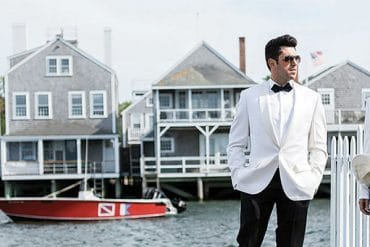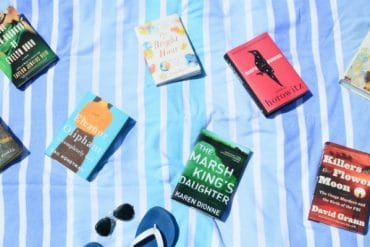 With Oscar-winning actors playing his characters in blockbuster films directed by the likes of Clint Eastwood and Martin Scorsese, Dennis Lehane’s literary success is not just found between the covers of his books. And yet, when talking to this bestselling author, Lehane seems just like a regular guy from Boston who can tell and wicked good story. “I grew up working class,” he says during our conversation, “I grew up the son of a union man. I grew up in a very northern European, ethnic, blue-collar, solidly democratic, east Coast neighborhood. That’s what I write about. That’s what I understand.” indeed, Lehane captures the voices of so many Bostonians in his novels, reflecting an intimacy with the city that only a writer born and bred in Dorchester can impart on the page. This June, Lehane brings this voice to the island as a featured speaker at the Nantucket Book festival.
With Oscar-winning actors playing his characters in blockbuster films directed by the likes of Clint Eastwood and Martin Scorsese, Dennis Lehane’s literary success is not just found between the covers of his books. And yet, when talking to this bestselling author, Lehane seems just like a regular guy from Boston who can tell and wicked good story. “I grew up working class,” he says during our conversation, “I grew up the son of a union man. I grew up in a very northern European, ethnic, blue-collar, solidly democratic, east Coast neighborhood. That’s what I write about. That’s what I understand.” indeed, Lehane captures the voices of so many Bostonians in his novels, reflecting an intimacy with the city that only a writer born and bred in Dorchester can impart on the page. This June, Lehane brings this voice to the island as a featured speaker at the Nantucket Book festival.
N Magazine: Many of your characters echo your Boston roots. What does this local dialect provide your stories with?
Lehane: Bostonians have a very distinct voice. If you travel around the country, you realize how rare that is: this voice of a place. New york has it, Boston has it, parts of the south have it, but in so many places everybody sounds like everybody else. It’s not just in the dropping the ‘r’s. It’s a way of looking at the world that is just very different than most people. That gives me a lot of rich territory when I write, and capturing that voice isn’t terribly hard because I grew up all around it.
N Magazine: Your plots often touch upon social issues such as racism, gang violence, child abuse, and drugs: Are you making a social commentary between the lines, or are those elements just adding texture to the piece?
Lehane: It just happens organically. I think I have always been, for lack of a better term, a “social writer.” I’ve been a writer of social issues certainly. It’s not something I plan. I start writing about something and that just begins to flower out of the sort of kernel that I start with. I don’t have to shoehorn my social agenda into a book.
N Magazine: You provide a portal to your readers into worlds that, especially for our Nantucket audience, can seem extreme or foreign. Do you think it’s important that people read books to get a sense of the other world that’s out there?
Lehane: I don’t believe in the writer that scolds. I don’t think it’s my job to serve you the medicine that’s good for you. I think that it’s good for all people to be aware of the rest of the world. One of the big problems we have in this country is this sort of major disconnect between us and them— them being whoever, whatever that list is. So is it good that people read books about people who are not like them? Yes, it’s great. Is that why I write those books? No, I write what I know. I write what I’m interested in.
N Magazine: Is “writing what you know” one of the elements of great fiction?
Lehane: I think “writing what you know” has been misinterpreted. It doesn’t necessarily mean that if you’re from a plumbing family, you write about plumbers. Or if you are from South Dakota, you write about South Dakota. it means write how you understand the world. I grew up working class. I grew up the son of a union man. I grew up in kind of a very northern European, ethnic, blue-collar, solidly democratic, east Coast neighborhood. That’s what I write about. That’s what I understand. But I don’t necessarily write about being the son of a guy who worked for Sears, roebuck for thirty-five years, which is what I am. That’s when we get into autobiography.
N Magazine: Clint Eastwood, Martin Scorsese, and Ben Affleck have made your books into blockbuster films. Hollywood actors like Leonardo DiCaprio and Sean Penn have played your characters. How did your involvement with the film industry come about?
Lehane: My first book was optioned I think two months after it was published, so that was my first experience with Hollywood. Then I had options arise a couple more times, and then I had Mystic River. Mystic River became such a big deal that I became the flavor of the month, and stayed there for quite some time. I had Shutter Island and Gone Baby Gone. Once Hollywood sees that, “oh, wow, they’ve made three critically successful movies, and two extremely financially successful movies out of his books,” well then Hollywood, they come running. They don’t understand what you’re putting in the soup, they just know they like the soup.
N Magazine: So what’s in the soup?
Lehane: Beats me.
N Magazine: So you don’t think there are certain elements to your books that lend themselves seamlessly to the silver screen?
Lehane: The only thing I can honestly see, and I’m not being falsely modest, I think I write very serviceable plots. They work. But are they original? I don’t think terribly. I don’t think they’re terribly fresh. I think Mystic River is nothing if not a 1930’s Warner Brothers crime melodrama. You can see the plot of Gone Baby Gone on “law and order” any day of the week. So I don’t think it’s my stories or my plots that are grabbing people. I think the only part I take any credit for is that actors seem to like to play my parts. I seem to write parts that actors really like to play.
N Magazine: What involvement do you have, if any, when your books are being made into movies? Did Clint Eastwood call you up during the filming of Mystic River and ask what your intentions were with this scene and that character?
Lehane: if Clint Eastwood calls me and asks me, then I tell him. I don’t call him and I don’t ask to. Ben Affleck has been working on Live by Night for quite some time now, and I have Ben’s phone number, I have his email, and I have not contacted him once. When he needs to contact me, he contacts me. Otherwise I’m just an intrusion. I think having been an artist now for twenty-seven years one of the things I’m really respectful of is the creative process. I don’t have a right to tell you how to do your process. I should just stay the hell out of your way until you need me. That’s the way it’s worked now for three films, and I’ve been consulted on all three films.
N Magazine: You’ve recently written for the hit television series “The Wire” and “Boardwalk Empire.” Does screenwriting offer you a different outlet than working on a novel?
Lehane: yes, it’s totally different. As Donald Westlake one famously said, “A novelist is god. A screenwriter is god’s tailor.” Working on a script is just different. You use different parts of your brain. It’s very barebones. There’s no obsession. To put it in perspective, a really tough thing for me has always been what I call “painting a room,” which is describing a scene. That to me is like pulling teeth. Somebody walks into a room and then I have to describe the room for you. That to me is one of the most difficult parts of writing novels. You don’t have to do that in a script. You don’t have to worry about it. You just say “interior room.” that, in and of itself, just cut my writing time by fifty percent.
N Magazine: Can you tell me about the projects you are working on right now?
Lehane: I’m a writer-producer on “Boardwalk Empire” this season, the HBO TV show. I’m doing rewrites on a script that is going into production right now by fox Searchlight called “Animal rescue.” I’m working on the next book, a continuation of the Hoffman family saga, which began on The Given Day. And then I’m actually working on another pass of a pilot script for a Patrick and Angie TV show.
N Magazine: Busy, busy. Well it will be nice to take a break on Nantucket for the Book Festival.
Lehane: Yeah, I love Nantucket. I haven’t been to Nantucket I think in ten years, but it’s a lovely place. It’s gorgeous





